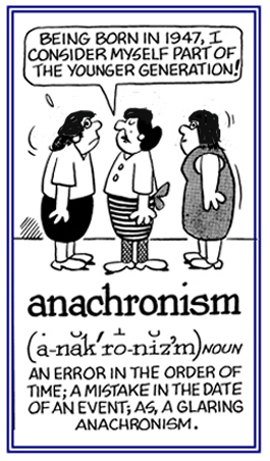-ism, -ismus
(Greek, ismos; Latin, ismus: a suffix: belief in, practice of, condition of, process, characteristic behavior or manner, abnormal state, distinctive feature or trait)
Starch, glycogen, fats, and proteins are all products of anabolic pathways.
2. The building up of the body's substance or the constructive phase of metabolism by which a cell takes from the blood the substance required for repair and growth, building it into a cytoplasm; thus, converting a nonliving material into the living cytoplasm of the cell.Anabolism is the opposite of catabolism, the destructive phase of metabolism.
2. Anything done or existing out of date, hence anything that was proper to a former age but is, or if it existed, would be out of harmony with the present: In the novel, which took place in the 16th century, the main character used the term “taboo”, which entered the language much later, an anachronism that the author evidently forgot to delete!
3. A situation which depicts a person or something that is not placed in the correct historical or chronological period, especially a thing or individual that belongs to an earlier age of existence: A portrait of Abraham Lincoln sitting in front of a computer would be an example of an anachronism.

Go to this Word A Day Revisited Index
so you can see more of Mickey Bach's cartoons.
2. Metamorphism that occurs deep under the earth's surface which changes simple minerals into complex minerals.
3. A distorted projection or perspective; especially an image distorted in such a way that it becomes visible only when viewed in a special manner (synonym: anamorphosis).
2. Behavior intended to overthrow or weaken a society’s formal system of government.
3. Resistance to all forms of authority or control.
Anarchism may be described as the doctrine that all the affairs of men should be managed by individuals or voluntary associations, and that the State should be abolished.
Anarchism is the only philosophy which brings to man the consciousness of himself; which maintains that God, the State, and society are non-existent, that their promises are null and void, since they can be fulfilled only through man’s subordination.
2. An interesting incident or brief history; story, tale, or short narrative; sometimes, a humorous account: Have you noticed that many public speakers begin their talks with humorous anecdotes?
4. A particular or detached incident or fact of an interesting nature; a biographical incident or fragment; a single passage of private life: Even among the ancient Greeks, there were two kinds of anecdotalisms: those given out publicly and those only known privately.
The latter kind was called anekdotos, "not published". The word was formed by combining a, an, "not", and ekdotos, "given out". From this source comes French anecdote and then English anecdote which originally kept the Greek significance of "unpublished narratives".
An unpublished narrative; especially, about interesting things and famous people, has a ready market; so anecdotes are eagerly brought out on every occasion, and the word lost its original sense, coming to mean simply "a story, an incident."
2. The theory that human beings are driven by physical appetites and not by nonmaterial issues: His animalism showed up in the way Jack ate his meals during which he was devouring his food as if he hadn’t eaten in days!
2. The ascription of psychic qualities to non living as well as living objects: Animatism is the assigning of some mystic standards or values to inert or even living things.
2. The view that a supernatural force enlivens and organizes the universe: In her religion class at school, Grace learned that animism was a hypothesis saying that an immaterial power breathes life into the universe.
3. The religious conviction that people have spirits that exist separately from their bodies: Adam often heard that many people believe that their souls continue to live on after they die whether in heaven or in eternal damnation.
4. Etymology: from Latin anima, "breath, spirit, life".
2. Someone or something that is peculiar, irregular, abnormal, or difficult to classify.


